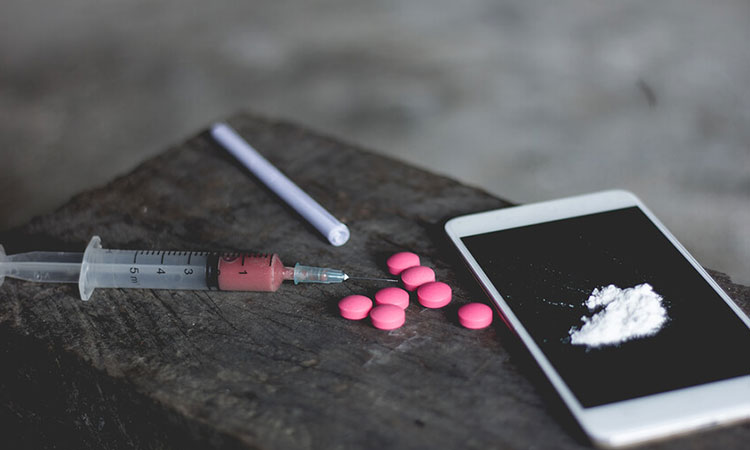
What Causes Drug Addiction?
Many factors can contribute to addiction. They may be related to genetics, family history, childhood trauma, social influences, or environment. For example, having an immediate family member who is addicted to drugs or alcohol, or being raised in an environment where substance abuse is generally accepted, can increase a person’s chances of developing drug dependence and addiction. Also, having a co-occurring mental health disorder can make a person more vulnerable to addiction.
Even in the 21st century, many people still believe that drug addiction is the result of a lack of willpower or a weak or immoral character. But, the medical community now widely recognizes that addiction is a chronic brain disease and not a character flaw.
The repeated use of drugs, such as heroin, cocaine, meth, or prescription opioids, causes significant changes in the structure and function of the brain. These substances alter with the way the brain processes neurotransmitters, which are chemicals in the central nervous that control vital functions including emotion, energy levels, pain response, sleep patterns, and metabolism.
The more a person uses intoxicating substances, the more his or her brain and nerves come to rely on these substances to induce feelings of pleasure, excitement, and relaxation. Drug addiction occurs when the repeated use of a drug alters the brain in such a way that the person can no longer function normally without it.
How Long Does it Take to Develop Dependence or Addiction?
There is no precise timeline on how long it will take for a person to become dependent on drugs or develop an addiction. The length of time largely depends on the type of drug being used, the amount that is regularly consumed, and the physical and psychological health of the individual.
Some substances, such as alcohol, cocaine, meth, heroin, some prescription opioids, and benzodiazepines, are known to lead to dependence rapidly. For some, the signs of drug tolerance and physical dependence can manifest after only a few uses, while in others addiction takes much longer to develop.

Drug Addiction Recovery Rates
With the help of professional addiction treatment program, a large number of people have learned how to live meaningful lives, free from the use of drugs and alcohol. While relapse rates among recovering opioid addicts may be as high as 90%, addicts who complete an inpatient treatment program are more likely to avoid relapse and remain drug-free long-term.
Indeed, addiction is a chronic disease, and relapse is one of its hallmark effects. It’s important for a person in recovery to realize that relapse is the rule and not the exception. That’s not to say that relapse is “okay”—it isn’t. Rather, relapse doesn’t have to be the end of the road and a cause for shame and self-loathing. Relapse prevention therapy can teach addicts how to prevent relapses, and how to minimize the severity of a relapse if it does occur.
Recovery rates are also higher for patients who have access to aftercare planning and support after they are discharged from treatment. Aftercare services include case management, alumni activities, community referrals, counseling services, sober living housing, medication-assisted treatment, and more. These services offer a source of security and support for recovering addicts during the vulnerable period transitioning from drug treatment back to the community in which triggers and environmental stressors still exist.
What to Do if a Loved One Has an Addiction
If you’ve recognized the signs and symptoms of drug addiction in someone close to you, you should attempt to intervene as soon as possible. Many people are hesitant to talk to a loved one about addiction because they don’t like confrontations, they are afraid that the loved one will jump to conclusions, or they don’t want to make the problem even worse.
Although it’s never comfortable to bring up the subject of addiction, reaching out to someone who is struggling could stop the progression of a potentially lethal disease. The following are steps you can take to express your concerns while protecting yourself and your loved ones from possible repercussions.
Initiate a One-on-One Discussion
If you don’t introduce the topic of drug addiction, it’s unlikely that your loved one will bring up the discussion of their own accord. Denial is a hallmark effect of addiction that doesn’t just affect the addict—it’s easy and comfortable for spouses, family, and friends to disregard the problem along with the addict. The best way to approach the situation is to have an honest, heart-to-heart talk with your loved one about how their behavior is impacting you and other people in their lives.

Consult an Interventionist
If your loved one is in total denial about the problem, he or she will probably decline to get treatment or refuse to listen to you. An addiction counselor or therapist who specializes in intervention can help you organize a formal meeting to confront your loved one with the adverse consequences of his or her behavior and recommend a treatment plan.
How to Tell Loved Ones That You Have an Addiction
The best way to tell loved ones that you are suffering from addiction is to be honest and open. However, be prepared for the possibility that they will not understand your condition. Many people still don’t realize that addiction is a chronic disease just like cancer, diabetes, or hypertension.
Your loved ones may criticize you or be in denial themselves and try to convince you that you don’t have a problem. If this happens, it is critical to stand firm in your new self-awareness and stay on track with your plan for treatment, regardless of whether you initially receive their full support or not.
Seek Support From Others and Research Treatment Options
Addiction treatment centers, counselors, therapists, and peer support groups can be invaluable sources of advice when you’re trying to help a loved one with an addiction (or you are trying to get help for yourself). A therapist can give you pointers on how to interact effectively with someone who’s in denial of their (or your) addiction. Twelve-step groups like Al-Anon, or Narcotics or Alcoholics Anonymous can offer support as well.
It’s never too early to begin exploring drug treatment options for you or your loved one.
Midwood Addiction Treatment offers a comprehensive approach to addiction that includes evidence-based services essential for recovery, such as psychotherapy, counseling, peer group support, health and wellness programs, and aftercare planning. We also offer detox and treatment options in partial-hospitalization, intensive outpatient, and outpatient formats.
If you or someone you love is struggling with an addiction to drugs or alcohol, contact us today to discuss treatment options. We are dedicated to helping people free themselves from the chains of addiction and restore the happy and fulfilling lives they deserve!